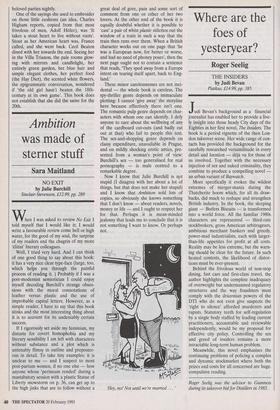Ambition was made of sterner stuff
Sara Maitland
NO EXIT by Julie Burchill Sinclair-Stevenson, £12.99, pp. 289 hen I was asked to review No Exit I told myself that I would like it; I would write a favourable review come hell or high water, for the good of my soul, the surprise of my readers and the chagrin of my more `elitist' literary colleagues.
Well, I tried very hard. And I can think of one good thing to say about this book: it has a very nice clear type-face (large, too, which helps you through the painful process of reading it. ) Probably if I was a post-modernist semiotician I could enjoy myself decoding Burchill's strange obses- sions with the moral connotations of leather versus plastic and the use of improbable capital letters. However, as a simple reader, I have to say that this book stinks and the most interesting thing about it is to account for its undeniably certain success.
If I rigorously set aside my feminism, my distaste for covert homophobia and my literary sensibility I am left with characters without substance and a plot which is untenably flimsy in outline and preposter- ous in detail. To take tiny examples: it is unclear to me — and I suspect to most post-partum women, if no one else — how anyone whose 'perineum rended' during a mastabatory session with a plastic Statue of Liberty snowstorm on p. 36, can get up to the high jinks that are to follow without a great deal of gore, pain and some sort of comment from one or other of her two lovers. At the other end of the book it is equally doubtful whether it is possible to `cast' a pair of white plastic stilettos out the window of a train in such a way that the train then runs over them. When a British character works out on one page that 'he was a European now, for better or worse, and had no need of phoney poses', then the next page ought not to contain a sentence that reads, 'They sped away from a Europe intent on tearing itself apart, back to Eng- land.'
These minor carelessnesses are not inci- dental — the whole book is careless. The spy-thriller genre depends on immaculate plotting: I cannot 'give away' the storyline here because effectively there isn't one. The romantic pulp genre depends on char- acters with whom one can identify. I defy anyone to care about the wellbeing of any of the cardboard cut-outs (and badly cut out at that) who fail to people this text. The sex-and-shopping genre depends on classy expenditure, unavailable in Prague, and on mildly shocking erotic antics, pre- sented from a woman's point of view: Burchill's sex — too generalised for real pornography — is male centred to a remarkable degree.
Now I know that Julie Burchill is not stupid (I disagree with her about a lot of things, but that does not make her stupid) and I know that Ambition sold lots of copies, so obviously she knows something that I don't know — about readers, novels, money or life — and I ought to respect her for that. Perhaps it is mean-minded jealousy that leads me to conclude that it is not something I want to know. Or perhaps not.
'Hey, no! Not until were married . . . '


























































 Previous page
Previous page